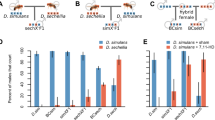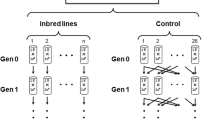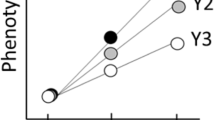Abstract
PETIT1 and others have shown that in a variety of Drosophila species the mating success of male genotypes is often dependent on their frequency in the population. This frequency-dependent mating effect seems to be relatively unimportant in females, and by favouring rare male genotypes represents a possible mechanism by which genetic variation can be maintained in a population. Whether or not this form of selection is wide-spread in natural populations is unknown, although, in the laboratory at least, it has been shown that the phenomenon occurs in insects other than Drosophila2,3.
This is a preview of subscription content, access via your institution
Access options
Subscribe to this journal
Receive 51 print issues and online access
$199.00 per year
only $3.90 per issue
Buy this article
- Purchase on Springer Link
- Instant access to full article PDF
Prices may be subject to local taxes which are calculated during checkout
Similar content being viewed by others
References
Reviewed by Petit, C., and Ehrman, L., in Evolutionary Biology, 3, (edit. by Dobzhansky, T., Hecht, M. K., and Steere, W. C.), 117–223 (Appleton-Century-Crofts, New York, 1969).
Sinnock, P., Am. Nat., 104, 469–476 (1970).
Grant, B., Snyder, G. A., and Glessner, S. F., Evolution, 28, 259–264 (1974).
Anderson, W. W., Proc. natn. Acad. Sci. U.S.A., 64, 190–197 (1969).
Author information
Authors and Affiliations
Rights and permissions
About this article
Cite this article
NUNNEY, L. Hardy–Weinberg ratios and rare male mating advantage. Nature 259, 304–305 (1976). https://doi.org/10.1038/259304a0
Received:
Accepted:
Issue Date:
DOI: https://doi.org/10.1038/259304a0
Comments
By submitting a comment you agree to abide by our Terms and Community Guidelines. If you find something abusive or that does not comply with our terms or guidelines please flag it as inappropriate.



